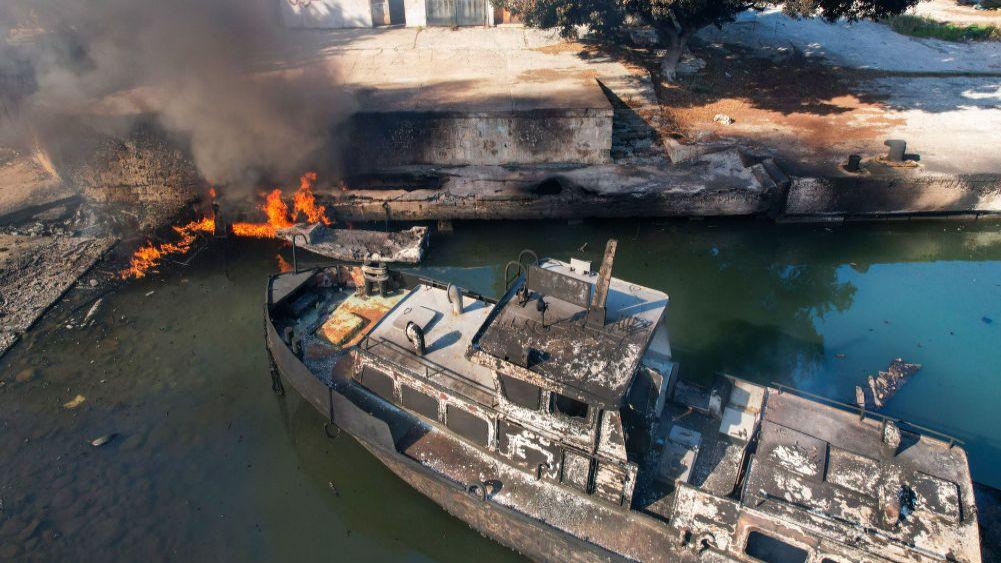Israel has escalated its military operations against Syria by confirming attacks on the Syrian naval fleet, aiming to dismantle military assets following the government’s destabilization after the fall of President Bashar al-Assad. The Israeli Defense Forces (IDF) reported that their navy struck at the ports of Al-Bayda and Latakia, targeting a total of 15 vessels that were docked. Video footage verified by the BBC depicted significant explosions at the port of Latakia, showcasing considerable damage to both the ships and port infrastructure. The IDF also stated that it has carried out over 350 air strikes across Syria, with the Syrian Observatory for Human Rights (SOHR) reporting more than 310 successful strikes since the Assad regime’s collapse. Israel categorized these strikes as essential to neutralizing threats against its state.
The focus of Israel’s military actions has been to “destroy strategic capabilities that threaten the State of Israel,” according to Israeli Defense Minister Israel Katz, who declared the operation against the Syrian fleet a success. The IDF didn’t limit its targets to naval assets; it struck various military installations, including airfields, military vehicles, anti-aircraft systems, and arms production facilities situated in Damascus and other critical locations such as Homs, Tartus, and Palmyra. Furthermore, warehouses and missile depots were targeted with the intention of preventing extremist groups from acquiring advanced weaponry. Israeli Prime Minister Benjamin Netanyahu delivered a stern warning to Syrian rebel factions, indicating that Israel would respond vigorously should Iran attempt to re-establish its presence in Syria despite Netanyahu’s prior overtures for peaceful relations with the new Syrian governance.
The intensity and range of Israel’s military operations have incited strong reactions, particularly from the Syrian government. Rami Abdul Rahman, the founder of SOHR, noted that Israel’s bombardments have significantly degraded the capabilities of the Syrian army, putting Syrian sovereignty at risk. Reports confirmed that IDF troops had ventured into Syrian territories beyond the designated demilitarized buffer zone, leading Israel to assert that such military misadventures are precautionary. The IDF denied claims of a tank advance toward Damascus, clarifying that their troops were stationed within agreed-upon separation areas meant to maintain peace between Israeli and Syrian forces.
Prime Minister Netanyahu characterized the IDF’s entry into Syrian territory as necessary for Israel’s defense as it seeks an arrangement to secure its northern borders. He expressed a desire for “neighborly and peaceful relations” with emerging forces in Syria while emphasizing that defensive actions would be unavoidable if peaceful dialogues fail. The Turkish government condemned Israel’s maneuvers, viewing them as an imperialistic approach during a critical time when peace and stability might be achievable for the Syrian populace—a sentiment echoing long-established tensions in the region regarding territorial sovereignty.
The background of Syria’s plight involves the significant disruption after Assad’s regime was undermined by a coalition of rebel forces, explicitly including the Islamist group Hayat Tahrir al-Sham (HTS), which publicly declared Damascus “free” following their occupation of the capital. This announcement came after a period of longstanding dictatorship that saw both Bashar al-Assad and his father dominate Syrian politics since 1971. The implications of such changes in power dynamics are vast, particularly concerning the control and future of Syria’s military resources, including suspected stockpiles of chemical weapons.
Israel’s operations against Syria continue to raise alarm regarding the delicate state of regional peace and the potential fallout from ongoing military engagement. The international community, particularly entities like the UN’s chemical watchdog, have begun urging Syrian authorities to secure any remaining chemical weapons, adding to the urgency of monitoring Syria’s military capability post-Assad. As Syria engages in the complex process of reconstruction and political realignment post-rebellion, Israel’s strategic incursion—not just in air strikes but also with ground forces—marks a significant chapter in the broader Israeli-Syrian conflict, maintaining a precarious balance of power within a profoundly destabilized region.

